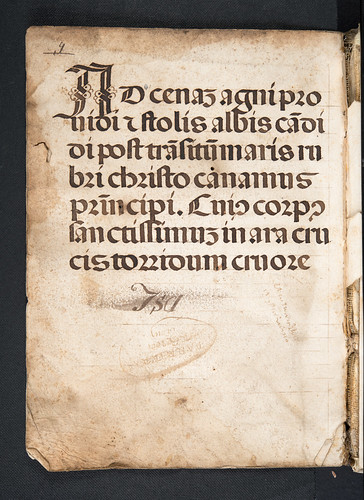Crastonus, Johannes: Lexicon latino-graecum (Vocabulista).
[Vicenza: Dionysius Bertochus, ca. 1483]
4to. a-i8 κ8 l-o8 p4. [116] leaves, the first and last blank.
ISTC ic00963000; Goff C963; BMC VII 1050; Bod-inc C-475; GW 7817.
| Shelf-mark: | Sp Coll Hunterian Bw.3.31 (see main library entry for this item) |
| Provenance: | Barrerius, Ludovicus/Barrière, Louis, of Avignon (fl. early 17th century): inscription on first front flyleaf “Ludouicus Barrerius Auenionensis filius doctoris [nine lines scored through] humanitatis alumnus 1601” and on l6r “Ludouicus”; intertwined cords resembling the letter “b” in brown ink on third front flyleaf; pasted onto modern front pastedown is a slip of paper (perhaps from the original pastedown) inscribed “Louis Barrier d’auignoin Bon parfois(?) estudiant a la [...]”. (For a manuscript, dated 1602, belonging to a Ludovicus Barrerius containing works on rhetoric, mathematics, astrology and horology, see University of Nottingham Library, MS 40). Robert Hoblyn, (1710-1756), politician: 'Bibliotheca Hoblyniana: sive, catalogus librorum, juxta exemplar, quod manu suâ maximâ ex parte descriptum reliquit Robertus Hoblyn ...' (London: J. Murray, 1769), p. 189; Hoblyn sale, 2 Mar. 1778 onwards; lot 2339 in 'Bibliotheca Hoblyniana ...' (London: Baker & Leigh, 1778). William Hunter (1718-1783), physician and anatomist: purchased by Hunter at the Hoblyn sale for £1.3.0 according to the annotated BL copy of the Hoblyn sale catalogue - shelfmark S.C.S. 11 (4). University of Glasgow: Hunterian bequest, 1807; Hunterian Museum bookplate on front pastedown, with former shelfmark "W.5.6". |
| Binding: | 16th/17th-century vellum; manuscript spine title “ACCURSIUS || ALPHABET. || LAT-GRE[C]”; 19th/20th-century endpapers. Size: 210 x 155 mm. |
| Leaf size: | 206 x 152 mm. |
| Annotations: | Faded and unread ownership(?) inscription in an early hand at top edge of first front flyleaf; frequent marginal annotations in a 16th/17th-century hand (mainly transcriptions of the Greek); title “Alphabetu[m] latinu[m] grece interpretatu[m]” on first front flyleaf (repeated on second front flyleaf) in a 16th/17th-century hand; on rear flyleaf, in the same hand, the hymn “Ad cena[m] agni prouidi [et] stolis albis ca[n]didi post tra[n]situ[m] maris rubri christo canamus principi. Cui[us] corp[us] sanctissimu[m] in ara crucis torridum cruore”. |
| Decoration: | None. |
| Imperfections: | None. |





